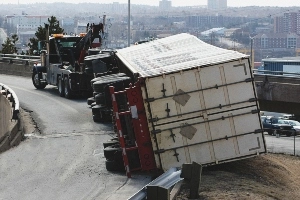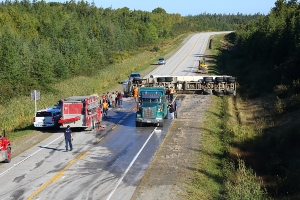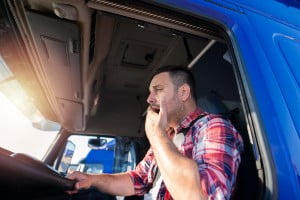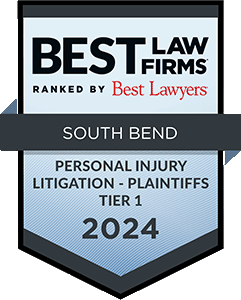Falling objects or unsecured cargo pose significant risks, potentially leading to severe crashes that can result in serious injuries and property damage. Multiple parties may be at fault for these crashes and could be required to provide compensation through their insurers.
Table of Contents
Properly securing cargo is not just a safety measure but a legal obligation. When truck safety negligence leads to accidents, victims may face medical bills, lost wages and emotional distress. Pursuing legal action can help alleviate these burdens by holding the responsible parties accountable.
For victims seeking compensation, determining fault in these incidents is essential. Do not hesitate to contact South Bend truck accident attorneys to learn the next steps to take if you were in a car crash due to someone’s else negligence.
Call us today for a free case evaluation: (574) 444-0741.
How Do Falling Object Accidents Occur?
Falling objects on the road can create hazardous conditions for all drivers. Several scenarios can lead to objects falling onto roadways. Some of the factors that can lead to objects falling off of a truck are:
Unsecured Loads: A Major Culprit
Improperly secured cargo on trucks and trailers often creates hazardous road conditions. While federal and state regulations mandate proper load securement, violations can still occur.
Both trucking companies and drivers are responsible for keeping loads secure during transit. If you are unsure of who may be liable for your accident, contact an attorney to discover who may be responsible for your damages.
Overpass and Bridge Incidents
Objects dropped or thrown from overpasses can strike other vehicles, causing devastating accidents and injuries. When individuals intentionally throw objects onto vehicles, it may be linked to criminal activity that may lead to jail time or other consequences. Municipalities responsible for maintaining bridges may face liability as well if falling concrete or other structural elements cause accidents.
Natural Debris and Acts of God
Falling tree limbs or rocks from hillsides can lead to crashes. Determining fault in these situations can be complex. Property owners adjacent to roadways may hold some responsibility for maintaining trees and addressing known hazards. However, sudden storms or truly unforeseeable events might fall under “act of God” exemptions, which means that no human parties can be held liable due to the accident being an unforeseeable event.
If the legal concept of “Act of God” is evoked, contact an attorney for information on how to navigate your claim. The next step may include proving the event properly falls under the “Act of God” to reallocate fault.
How Does Indiana Determine Fault in These Situations?
Determining fault in a Indiana falling object accident requires examining negligence and liability. This process requires careful consideration of evidence and the potential involvement of multiple liable parties, ensuring a fair and just outcome for those affected by such incidents.
Some of the factors that are used to determine fault in a falling object accident are:
Duty of Care
All drivers have a duty of care to other drivers and pedestrians on the road. This responsibility includes properly securing any cargo or items being transported. Failing to take reasonable steps to prevent objects from falling onto roadways can be seen as negligence. Failure to adhere to these responsibilities can strengthen a victim’s case for compensation.
For commercial trucking drivers, this duty of care includes:
- Properly loading and securing cargo
- Conducting regular inspections during transit
- Adhering to weight limits and distribution guidelines
- Maintaining equipment used for securing loads
Negligence Per Se
In some cases, falling object accidents involve clear violations of traffic laws or safety regulations. When this occurs, the legal concept of “negligence per se” may apply. This doctrine states that when a person violates a law or regulation designed to protect the public, they are considered negligent. Proving these violations can significantly strengthen a victim’s claim.
Examples of relevant violations include:
- Exceeding vehicle weight limits
- Failing to use required tie-downs or cargo restraints
- Violating hours-of-service regulations for commercial drivers
Multiple Parties and Shared Fault
Falling object accidents often involve several potentially responsible parties. Identifying all liable parties ensures that victims can pursue proper compensation for their injuries.
A thorough investigation may reveal shared fault among:
- The driver of the vehicle carrying the fallen object
- The company that loaded or owned the cargo
- Manufacturers of defective tie-downs or restraints
- Government entities responsible for road maintenance
- Third-party contractors involved in loading or securing cargo
What Damages Can I Recover After a Cargo Accident?
Victims of crashes caused by falling objects or cargo may be entitled to compensation to help them recover from their injuries and losses.
Key areas where victims can find financial compensation:
- Medical Expenses: This includes costs for current medical treatment, such as hospital bills, surgeries, and rehabilitation, as well as future medical expenses that may arise due to the injury.
- Lost Wages and Diminished Earning Capacity: Victims can claim compensation for the wages they lost during recovery if the accident leads to missed work. Additionally, if their injuries affect their ability to earn in the future, they may receive compensation for that diminished earning capacity.
- Property Damage: Victims can also seek reimbursement for any damage to their vehicle or other personal property resulting from the accident.
- Pain and Suffering: This compensation addresses the physical pain and discomfort from the injury. It reflects the suffering victims experience, which can impact their daily lives.
- Emotional Distress: Beyond physical injuries, many victims face emotional challenges after an accident, such as anxiety, depression or post-traumatic stress. Compensation can help address these psychological impacts.
- Loss of Enjoyment of Life: Injuries may prevent victims from participating in activities they once loved, from hobbies to spending time with family and friends. Compensation in this area acknowledges the loss of those enjoyable experiences.
Contact Our Law Firm for Help Today
If you or a loved one has been affected by an accident caused by falling objects or unsecured cargo, it is important to understand your rights and options for seeking compensation. Pfeifer, Morgan, and Stesiak have a proven history of delivering successful results for clients in similar cases.
Our experienced and compassionate lawyers are committed to securing the compensation you deserve. Schedule a free initial consultation with us—there are no upfront costs or fees, we only win if you do.
Call today to learn more: (574) 444-0741.











